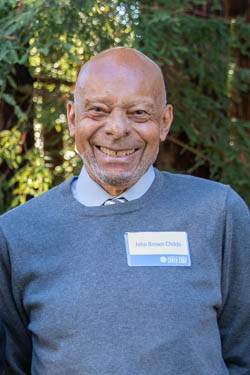Campus News
John Brown Childs earns UC’s highest system-wide award for emeriti
UC Santa Cruz Distinguished Professor Emeritus of Sociology John Brown Childs is a 2021-2022 recipient of the Constantine Panunzio Distinguished Emeriti Award, which recognizes exceptional legacies of research, teaching, and service.

UC Santa Cruz Distinguished Professor Emeritus of Sociology John Brown Childs recently earned the University of California’s highest award for emeriti faculty. On May 2, Childs was selected as a 2021-2022 recipient of the Constantine Panunzio Distinguished Emeriti Award, which recognizes exceptional legacies of research, teaching, and service.
Since the award’s creation in 1983, 49 University of California emeriti professors have received the honor. Childs is the ninth recipient from UC Santa Cruz. He is a pioneer in community-engaged scholarship for social justice whose work draws upon the teachings of Martin Luther King Jr. and peacemaking practices of the Haudenosaunee/Iroquois Confederacy. Childs’ theory of transcommunality offers methods for cooperation between diverse groups, centered upon the ethics of mutual respect.
He retired in 2009, after teaching at UC Santa Cruz for more than 20 years, but has remained a leader in many projects across campus. That includes the naming of College Ten for John R. Lewis and the development of a course called Transcommunal Peace Making that brings together UCSC undergraduates and incarcerated men from the Correctional Training Facility in Soledad to learn collaboratively. He’s also working on a book, called Voices from Soledad Prison, based on his partnership of more than a decade with the Barrios Unidos Prison Project.
“I cannot think of another colleague who exhibits the same dedication and passion in enacting their scholarship toward healing the wounds and divides in our society,” said Flora Lu, Provost of John R. Lewis College and College Nine, who was among Childs’ nominators for the award. “Professor Childs’ intellectual work is inextricable from his commitment to moral values and elevating the wisdom of people who are minoritized and marginalized.”
“Professor Childs originated the Sociology Department’s now central focus on community-engaged research and continues to have a major impact on social justice efforts and organizations in Santa Cruz County and beyond,” said Sociology Chair Miriam Greenberg, another of Childs’ nominators. “He is a leader in seeking restorative alternatives to gang and youth violence, in creating critical intellectual and community-building space for people—particularly men and youth—who are incarcerated, and in developing opportunities for youth leadership that bridge campus and community.”
Looking back over his career, Childs says contributing to creating a better society has long been his dream. And learning, teaching, and community-engaged work are all interconnected endeavors on that pathway. In many ways, he’s also following in the footsteps of his ancestors.
Child’s paternal ancestors were among a group of Black families who helped to found Lincoln Normal School, one of the first schools for African American teachers and students established after the Civil War. He’s also an enrolled member of the Massachusett Tribe at Ponkapoag, and his scholarly approach is heavily influenced by Native American prophet Deganawidah, or “the Peacemaker.” Deganawidah helped to bring peace among five warring Indigenous nations, resulting in the founding of the Haudenosaunee/Iroquois Confederacy.
“Transcommunality is drawn from the Peacemaker’s ways of reaching peace among those who are at war,” Childs said. “Deganawidah is very much alive for me, so in a way, I’m just passing on his message of peace and constructive, positive interaction.”
Childs’ work has also been influenced by his involvement in the civil rights movement, which taught him the philosophy of nonviolence and the power of community organizing. As a college student, Childs organized a group of students to attend the March on Washington for Jobs and Freedom in 1963. And through the organization Friends of the Student Nonviolent Coordinating Committee, he participated in voter registration efforts in the South in 1965, shortly after “Bloody Sunday,” when John Lewis and other civil rights activists had been brutally beaten. These experiences inform Childs’ work to this day.
“I saw some very scary things,” Childs recalled. “I saw and experienced violence. But I also saw the courage and hopefulness of the people involved in the movement. And, ultimately, I saw the impact that had and the changes that happened. I learned that what seems immovable is actually movable.”
Today, Childs continues to play his part in working to create a better society, and he has inspired countless others within the university and community to join him on that path. He says the relationships he’s built along the way have been one of the biggest high points of his career.
“Being at UCSC has just been the best career and life experience I’ve had because of the academic and community interconnections that exist here,” he said. “What has kept me going over the years is working with people who share the ethical spirit of doing good in the world, to the best of one’s ability. And I sure plan to continue that, as long as God lets me be here.”